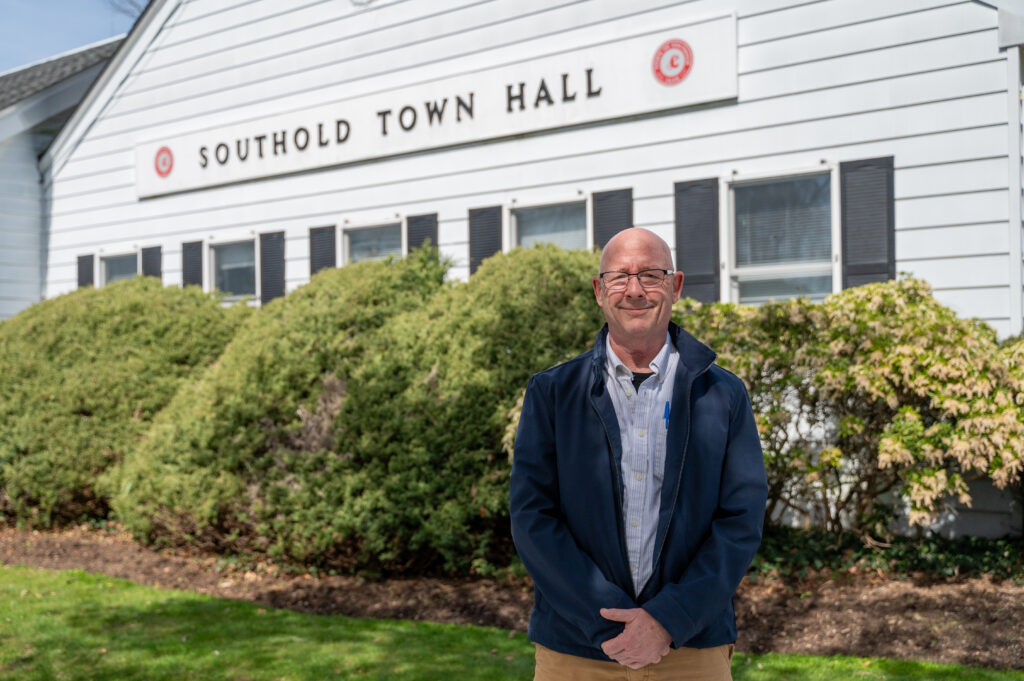Things waterfront property owners should know from last week’s SoutholdVOICE meeting

Southold Town is considering a pair of amendments to the town code that could affect waterfront property owners.
The changes were among the topics discussed at Saturday’s meeting of SoutholdVOICE, a nonprofit promoting awareness of issues affecting shoreline and marine resources.
Councilwoman Jill Doherty joined Trustees Mike Domino and John Bredemeyer on the panel at the meeting, which was led by SoutholdVOICE chairman Marie Beninati.
Here’s what you need to know about what was discussed:
BANKS AND BLUFFS
Southold Town is expected to reintroduce a bill this week to distinguish between banks, bluffs and bluff limits in sections of the town code regulating wetlands and shorelines. The new bill will reflect changes suggested at a Feb. 14 public hearing on a previous draft of the legislation, which also aims to limit duplicate reviews of shoreline building projects.
“We never had a separate definition of bank,” Ms. Doherty said. “So a lot of times banks and bluffs were mixed together. People that live on the water, they know if they have a high bluff or a bank.”
The changes also include removing language from the zoning code that town officials hope will streamline the process for some applicants who previously had to visit both the Board of Trustees and Zoning Board of Appeals when seeking a variance for a bluff setback.
“You won’t have to have that double review,” Ms. Doherty said. “Hopefully this will make it simpler for all.”
The revised bill is expected to be discussed at Tuesday’s Town Board meeting and scheduled for a public hearing in late April or early May, Ms. Doherty said.
MARINE CONTRACTOR LICENSING
Mr. Domino, president of the Board of Trustees, introduced plans to require marine contractors to obtain a license from the Southold Town Clerk in a town code amendment that also increases fines for contractors who do not obtain permits or comply with the terms of a permit for shoreline work. Mr. Domino said the heightened fines and licensing requirement, which would cost $200 in the first year and $100 annually for renewal, would help cut down on the use of vendors with “little or no marine construction experience.”
“This [type of] contractor does not feel obligated to follow the design, the wetland code, mound requirements or just simple community standards,” Mr. Domino said. “The community gets stuck with an inferior product.”
Mr. Domino, who has served as board president since January, said local marine contractors have been receptive to the idea and he doesn’t see any issues getting them into compliance.
He said the Board of Trustees continues to average about 40 site visits per month and has found that problems with contractors performing substandard work and ignoring regulations, or the construction of illegal docks, can take up as much as 20 percent of the Trustees office’s time.
Fines for a first offense would be increased from a range of $500 to $4,000 to a new range of between $1,000 and $6,000. Fines for second offenses would be between $2,000 and $10,000, up from the current standard of between $1,000 and $7,500.
Mr. Domino said he’s hopeful the Southold Town Board will take up the town code amendment at a future meeting.
CONSERVATION ADVISORY COUNCIL
Mr. Bredemeyer spoke of a plan to refocus the responsibilities of Southold Town’s five-member Conservation Advisory Council. He said the council, which is mandated by state law, often provides duplicate services as the Board of Trustees, such as field visits similar to the ones already being conducted by the Trustees.
In an effort to better balance the responsibilities of the CAC, which serves on a strictly advisory level and has no legislative authority, with those of the Trustees, Mr. Bredemeyer suggested having the CAC instead oversee conservation-based activities and grant proposals.
“Instead of simply coming along and following the Trustees around on field inspections and coming up with many of the same ideas that we have to write into a permit anyway, the CAC can instead be helping out with a number of these other projects,” Mr. Bredemeyer said.
One example he gave was for the CAC to oversee an upcoming phragmites removal project through the New York State DEC and Group for the East End at Great Pond in Southold. Mr. Bredemeyer also suggested the Town Board commission the CAC to study coastal erosion in Southold Town.
“The CAC role should be more defined and brought more in line with [its] original intent,” he said. “This will make the work more efficient on our end.”
Editor’s Note: An earlier version of this story incorrectly identified the Conservation Advisory Council as the Coastal Advisory Council. We regret the error.









